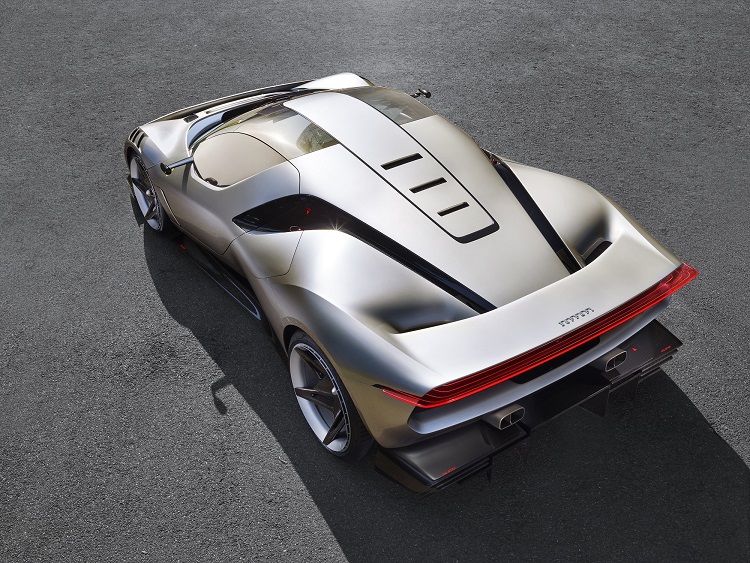Ferrari unveiled the latest addition to its One-Off series, the Ferrari KC23. The latest in the marque’s Special Projects programme, it was commissioned by one of the Prancing Horse’s leading collectors. The KC23 one-off is a bold and extreme vision of what the closed wheel racing of the future may look like. A superlative new take on the most successful track car in Maranello’s 76-year history, the 488 GT3 in its ‘Evo 2020’ version, it pulls off the incredible feat of exuding elegance when at a standstill and thrilling the viewer once on the move, thanks to ground-breaking aerodynamic solutions, such as motorised air intake vents and an imposing rear wing.
Designed by the Ferrari Styling Centre led by Flavio Manzoni, the KC23 is based on the 488 GT3 Evo 2020 platform from which it inherits its layout, chassis and engine. The base for the project was very special indeed: the 488 GT3 has been racing since 2016 and to date, it has triumphed in the world’s most prestigious endurance races, racking up over 530 victories and winning more than 119 championships, making it the most successful racing Ferrari in history.
Given the extreme nature of its engine, chassis and suspension set-up, the KC23 was designed exclusively for non-competitive track use. Its most unusual feature is its dual configuration. At a standstill, the car’s layout showcases its clean, sleek, sinuous forms, but once it hits the track its visual stance is dominated by its impressive air intakes, which open automatically, and its imposing rear wing.
From the very earliest days of the project and in agreement with the client, the Ferrari Styling Centre focused on creating a radical one-off car completely free of homologation constraints and clothed in the kind of timeless lines that would make an instant classic whilst also providing a tantalising glimpse of the future of supercars. That challenging goal demanded that every single one of the 488 GT3 Evo 2020’s lines being redesigned, glass surfaces and light clusters included.
The result is that the car has a monolithic beauty, as if it were sculpted from a single block of metal. The design also hides several of the car’s technical functions, particularly the side air intakes, which open automatically when the mid-rear V8 twin turbo is turned on. This gives the KC23 an almost lifelike look, as its shape changes depending on what it being used for. The rear wing is also removable to underline its clean, formal lines when not on the track.
The surface treatment is smooth and seamless, with sharp angles reduced to an absolute minimum to underscore the KC23’s spare, sinuous purity in the pursuit of an iconic, futuristic design that will stand the test of time. When the driver turns on the engine before taking it out on the track, the KC23 undergoes a radical transformation, its racing stance and aggression suddenly very much to the fore. It is impossible to ignore its imposing rear wing, which marks it out as a racing car designed to scythe through the corners and unleash every single horsepower the V8 can generate.
In terms of downforce and cooling, the designers worked hard to retain the performance of the donor car despite the fact that the KC23 has a completely different silhouette. Panels were developed with custom kinematics that activate automatically when the engine is turned on: the one behind the front wheel reveals a fence, which boosts front downforce to balance the car aerodynamically. The panel at the rear provides the correct amount of intake air to the intercoolers and auxiliary components, as well to the engine.
The KC23’s butterfly doors open vertically on single front hinges, an architectural solution it shares with another iconic supercar, the LaFerrari. No changes were required to the greenhouse or the car is structural to incorporate this feature. The clam-shell bonnet has a simple opening system – just two pins need to be removed to allow the front to be inspected and maintenance work to be done. Both headlights and rear lights have been redesigned, with the most radical change to the rear lights where striking methacrylate light blades, inspired by the Ferrari Vision Gran Turismo, spring to dazzling life when the engine is turned on.
Even the car’s glass surfaces were influenced by the design philosophy underpinning the KC23: they are seamlessly integrated with the bodywork, with no visible pillars, frames or seals, creating a clearly aeronautics-derived dome effect. Their metallic finish melds seamlessly for maximum styling continuity, creating a strikingly futuristic result.
Another distinctive feature is the KC23’s Gold Mercury livery, courtesy of a specially-developed, four-layer aluminium paint. The liquid metal in the paint gives it an astonishingly luminous gleam in sunlight and the colour itself seems to change constantly depending on the type and angle of the light striking it, giving an extraordinarily captivating effect.
The cabin has been kept as pared-back and similar to the 488 GT3 Evo 2020 as possible, with the exception of the door panels and dashboard finish on the passenger side. The KC23’s specific seats, trimmed in Alcantara® with an electro-welded logo, lend the cabin an elegance that is perfectly in tune with the exterior. Rearward visibility is ensured by a video camera system that also had a beneficial impact on the car’s aerodynamics, as the traditional wing mirrors could be removed and the line of the flanks left unsullied.
The car has two sets of specifically designed wheels: 18” wheels will allow the KC23 to dazzle on the world’s circuits while 21” wheels at the front and 22” wheels at the rear will captivate the public when it is displayed in its static configuration.
The new arrival took over three years to develop and now joins the most exclusive group in the Prancing Horse’s range: bespoke cars crafted to the specifications of a client, making them the very pinnacle of Ferrari’s personalisation strategy. It will be making its first public appearance between July 13th and 16th at the Goodwood Festival of Speed, one of the UK’s most important motorsports events. From August 1st to October 2nd, it will be on display at the Ferrari Museum in Maranello, much to the delight of all of the enthusiasts eager to admire its extraordinary formal and engineering solutions at first hand.





